Control dandelion, crabgrass, and other unwelcome garden guests with the right weed killer for your needs can be possible with a weed killer. Ahead, learn about the different types of weed killers and how to choose between them—and don’t miss our roundup of top-favorite picks!
Whether they crop up on your lawn, in a flower bed, or along the perimeter of a fence, weeds are the gardener’s age-old enemy. They make your yard unsightly, your walkway unkempt, and they compete with neighboring plants for sunlight, water, and nutrients, causing your cherished plants to weaken and be susceptible to pests and disease. Weed species can even spread and disrupt natural habitats. Worst of all, weeds just seem to keep coming back no matter what you do.
Fortunately, there are a few options for weeding these invaders out for good: deadheading weeds with garden shears or a weed wacker (cutting off the tops), removing them from the soil by hand or using weed killers. Of these methods, deadheading is generally useful only for annual plants that don’t have extensive root systems and that die when the tops are separated from the roots.
Pulling weeds by hand, meanwhile, is impractical if you have a large number of weeds due to the effort involved (not least because doing so effectively requires digging up the roots to keep them from growing back). The limits of these manual methods make commercial weed killers the more fail-safe, flexible option for eradicating weeds—provided you choose the right one for the job.
Weed control in green areas or landscapes is difficult due to the complexity of many plantations. Green areas can include lawns, plant beds, perennials, shrubs, and trees. It is usual to plant more than one species of different plants in a green area, and there is often a mixture of perennial and annual ornamental plants. The wide variety of ornamental species, soil types, irrigation systems, slopes, and the use of mulches create the need for a variety of options for weed control.
Due to the many variables, weeds in landscape plantings are generally controlled with a combination of non-chemical and chemical methods.
Herbicide
The term “herbicide” is a combination of two Latin words, “herba” and “caedo”, which in translation mean “grass” and “kill”. The action of herbicides is aimed at killing weeds that interfere with the cultivation of crops. Manual weeding in large areas is unprofitable and impractical: weed seeds from neighboring areas will fall on the cleaned soil and germinate again.
You will have to repeat the processing several times, spending a lot of time and effort. The pesticides on the market differ in their mechanism of action, but they always cope with the task quickly and efficiently.
Prevents soil erosion and reduces moisture loss
In addition, the use of herbicides can reduce or eliminate manual or mechanical treatments, which in turn prevents soil erosion and reduces moisture loss. This effective weed killer penetrates directly into plant cells, decomposing, and killing weeds with toxic compounds. However, at the same time, by the nature of their action, herbicides are divided into two categories: selective herbicides and continuous herbicides. They keep agricultural crops intact, affecting only weeds.
Use of Herbicides
Today, herbicides against weeds are actively used in forest clearings, industrial facilities, along roads, at airfields, or under power lines.
- Tenacity Turf Herbicide – 8 ounces
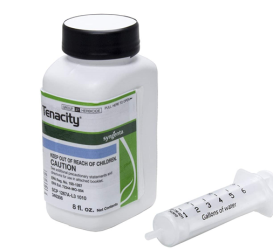
Product Description
Shelf life
Tenacity Turf Herbicide has a shelf life of 5 to 8 years from the date of manufacturing. But make sure that you are properly storing it and keep out of direct sunlight and extreme temperatures.
Active ingredient
Surprisingly, there is an active ingredient called mesotrione that is present, which is a naturally occurring compound produced by the bottle brush plant. Its main action is inhibiting photosynthesis in weeds.
Good absorption
There is a good absorption of Tenacity Herbicide by plants through the roots, shoots, and leaves, which is distributed throughout the plant.
Features
- Tenacity is an amazing weed killer, which is a systematic pre-emergence and post-emergence herbicide.
- It is specially designed for selective contact and residual control of weeds in the turf grasses.
- When you apply the weed killer as a pre-emergent, then all the weeds absorb tenacity during emergence from the soil.
- The active ingredient in tenacity is measured, which is 40% in the formula.
- Keep this in mind that the date which is mentioned on the bottle is the manufacturing date, not the expiration date.
Pros and Cons
Pros
- It has a shelf life of 5 to 8 years.
- It gives you Post-emergence control of many weeds.
- This weedkiller is absorbed efficiently by the plant’s parts.
Cons
- It does not work efficiently on wild violet.
- Quali-Pro Prodiamine 65 WDG (Generic Barricade 65 WDG) (5 lbs) – Pre-Emergent Herbicide
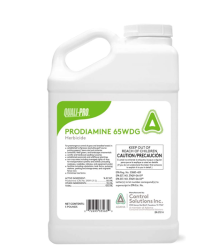
Product Description
Active ingredient
The active ingredient present in Quali-Pro Prodiamine 65Is Prodiamine, which is present 65% in the formula.
Effective against many famous weeds
It is a very effective weed killer that can kill different weeds such as annual bluegrass, knotweed, chickweed, goosegrass, foxtail, etc.
Covers large area
Moreover, it has the ability to cover large areas of fields or grasses.
Features
- It is an incredible pre-emergence herbicide that gives you the broadleaf and pre-emergent grass weed control.
- It is available in a five-pound bottle and allows the flexible application for both Spring and fall use.
- It is specially designed for clearing the weeds at a professional level.
- You can use this formula in different landscapes and Golf courses.
Pros and Cons
Pros
- It is a fantastic commercial-grade Herbicide.
- It works great as pre-emergent.
- It is easy to use and have fast action.
- Lastly, it is an affordable weed killer for large areas.
Cons
- The formulation does not have active ingredients in it.
- Roundup Concentrate Max Control 365 Vegetation Killer, 32 oz.
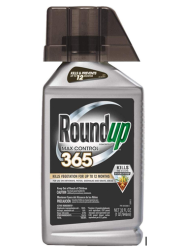
Product Description
An economical way to treat Weeds
Roundup gives you an economical and effective way to treat large areas.
Ideal for Large Areas
It gives the additional value and is good for treating larger areas; however, it is available in different sizes.
Can Kill weeds to the Roots
You can get rid of weeds for up to 12 months as it has the ability to kill the weeds to the roots.
Features
- Roundup concentrate maximum control kills the weeds as well as prevent the weed formation for up to 12 months.
- It will create an invisible barrier in the soil.
- The formula is very efficient as it kills the weeds to the root.
- You can use this weedkiller on sidewalks, gravel areas, patios, and driveways.
- Moreover, it will give you the visible results in 12 hours and also it is rainproof.
Pros and Cons
Pros
- It is very important as well as rainproof.
- It comes with very fast action in eradicating the weeds.
- It can clean your gardens in 12 months almost.
Cons
- Sometimes, people question its formulation, but overall it is a good product.
- Southern Ag Amine 24-D Weed Killer, White Bottle
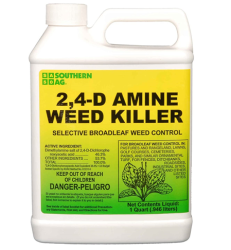
Product Description
Controls many Plants
Along with the weeds in the plants, it also has the ability to control many woody plants as well as many broadleaf weeds.
Pre and Post-Emergent Herbicide
You can use this herbicide to use in different areas such as pastures, golf courses, lawns, corn, fences, etc.
Easy Application
Its application is very easy; you can put it in a low-pressure spray with a convenient fan-type nozzle.
Features
- You can use this weed killer in lawns, Golf courses, cemeteries, parks, rangeland lawns, pastures, etc.
Pros and Cons
Pros
- It is an incredible solution for spot treatment and large properties.
- You can see the effective results in just a week.
- It is so strong that it can even kill bamboo shoots.
Cons
- It is a great product, but you have to wait for two weeks to see an effective result.
- Roundup Weed & Grass Killer Concentrate Plus
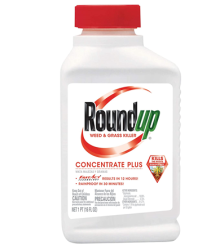
Product Description
Can Kill the Toughest Weed
It is a good weed killer that can kill the toughest weeds and grasses to the roots.
Fast Action
It comes with fast action and gives you a fast result, even within 12 hours.
Use in Different Areas
You can use this herbicide in different areas such as walkways, gravel areas, patios, driveways, edging, and foundations, etc.
Features
- This is a great weed killer that can kill the toughest grasses and weeds to the root.
- In addition, you can also use a tank sprayer.
- Moreover, you can use this weed killer in walkways, fences, edging, gravel areas, shrubs and trees, lawn replacement, or garden plot preparation.
- You must not use it around existing edibles.
- It becomes rainproof in just 30 minutes.
Pros and Cons
Pros
- It can cover up to 6,000 feet area.
- It produces good results in just 12 hours.
- It is available in three sizes, such as 16 ounces, 32 ounces, and 64 ounces.
- It will be rainproof in just 30 minutes.
Cons
- There is a need to concentrate on the formula.
- Southern Ag CROSSBOW32 Weed & Brush Killer, 32oz-1 Quart Crossbow Specialty Herbicide 2 4 D & Triclopyr Weed & Brus, (s) (32 oz)
Product Description
Use on Large Areas
You can use this weed in different large areas such as rangeland, grass pastures, as well as non-crop areas.
What to Avoid
Make sure that you are not using Southern Ag on crops, timber, or other plants being grown for sale or for commercial use.
Easy Application
You can use this weed killer easily where you have to use 4 to 6 fl.oz for spot application.
Features
- The size of this weed killer is one quart.
- In the formulation, it contains 2,4-dichlorophenoxyacetic acid, butoxyethyl ester, and triclopyr.
- Additionally, you can use this weed killer on rangeland, non-crop areas, and grass pastures.
- So it also is able to control most unwanted trees and brushes.
Pros and Cons
Pros
- It is a fantastic solution for spot treatment of weeds.
- Surprisingly, it is available in three sizes as well as spray bottle variety.
- This weed killer can kill clover, chickweed, dandelion, and much more.
- It has the ability to kill the weeds that are present under the surface of the ground.
Cons
- Some people have a question about its high price.
- Ortho Weed B Gon Chickweed, Clover & Oxalis Killer for Lawns Concentrate, 16 oz.
Product Description
Connect directly
The weed killer is connected directly to the compatible concentrate bottle. All you have to do is to remove the cap from the bottle and connect the applicator firmly with a one-quarter turn.
Designed to get rid of many harmful weeds
It is an excellent herbicide that can kill many harmful weeds such as oxalis, clover, dandelion, as well as wild violet and creeping charlie.
Formulation
The liquid actually contains 8% triclopyr. This is actually the active ingredient that effectively kills the weeds up to the roots.
Features
- This herbicide can effectively kill the creeping charlie, also named as the ground I v y and wild violet.
- When you spray it on the lawn, it will not harm the lawn grass.
- It is rainproof and shows the results in just 6 hours.
- Moreover, this weed killer can be used to kill the weeds up to 3200 square feet.
- Most amazingly, it kills the wheels to the roots.
Pros and Cons
Pros
- This weed killer kills weeds very efficient and easy to use.
- It is a great solution for large properties and fields which are overgrown with weeds.
- It offers a great area of coverage.
Cons
- Sometimes, show the late results.
- PBI/Gordon 652400 Speed Zone Lawn Weed Killer, 20-Ounce – Brown/A
Product Description
Works on creeping charlie
This is the amazing herbicide that works well on creeping charlie as it is an efficient lawn weed killer.
See the results in less period
PBI works very efficiently, where you can see the results in a very short time. Keep this thing in mind that if you are not getting the results in the first week, you have to apply in the second week. After the 2nd week, you will see a drastic change.
Can solve many issues
With this weed killer, you can solve many of your concerning issues such as wiping the weeds from the lawn as well as getting rid of some harmful weeds from the bushes.
Features
- This weed killer gives you the results in hours.
- It is a protective weed killer that does not harm the lawn grasses.
- Its action is effective and rapid for common weed species.
- Moreover, it will cover the area from 14000 to 18000 square feet.
Pros and Cons
Pros
- It has a very effective formulation and contains all the natural and organic ingredients.
- It is very easy to use to spray into larger areas.
- This vehicle has the ability to kill the weeds in as little as 24 hours.
Cons
- According to someone, it is not very efficient, but it depends on the type of weeds you have in your area.
- Ortho 9906010 Weed B Gon plus Crabgrass Control Concentrate2, 32 Ounce, Brown/A
Product Description
Rainproof in only one hour
The most amazing thing about this weed killer is that it is rainproof in only 1 hour. Also, you can see the results in just 24 hours.
Guaranteed to Kill many weeds
The weed killer is famous for killing many weeds such as dandelion, crabgrass, as well as many listed common lawn weeds.
Kill the weeds without damaging the lawn
If you are interested in purchasing the weed killer, which does not damage your lawn and only kills the weeds, then you are in the right place.
Features
- Ortho 9906010 weed kills more than 200 weeds.
- Most amazingly, it has the ability to kill the weeds to the roots.
- It can effectively kill the dandelions, crabgrass, and other common lawn weeds.
- It is a hundred percent guaranteed by the manufacturers that this weedkiller will not harm the lawn.
- When you spray it to your fields or lawn, then it starts working immediately.
Pros and Cons
Pros
- Weeds start dying in just 24 hours.
- It has the ability to kill the weeds all the way down to the roots.
- Additionally, it can speed up the lawn care process and kill the weeds fastly.
- It is an incredible product for spot treatment.
Cons
- Some people are not satisfied with their packaging.
- Roundup For Lawns3 Ready-To-Spray (Northern), 32 oz. – Lawn Safe Weed Killer
Product Description
Weeds do not come back
First of all, it can kill the weeds so effectively that they do not come back again. So, it is a fast-acting formula that gets right to the roots.
Northern Grass Type
This weed killer is specially designed to kill the weeds and not your lawn. It is very good for nothing grass types such as fescue, perennial, and bluegrass.
Can kill more than 250 weeds
Fantastically, this is an incredible weed killer that can kill more than 250 listed weeds such as clover, yellow nutsedge, crabgrass, etc.
Features
- You can easily use this ready to spray applicator to your entire lawn.
- It will cover up to 5000 square feet of area.
- Surprisingly, it has the ability to kill more than 250 weeds, including dandelion, clover, crabgrass, etc.
- It is rainproof and works in as little as three hours.
- You can use this weedkiller on Northern grasses, including Kentucky, bluegrass, fescue, Bermuda grass, buffalo grass, etc.
Pros and Cons
Pros
- This is an amazing weed killer, which kills the weeds as little as 24 to 48 hours.
- You do not have to worry about the rain because it dries out quickly.
- It comes with an amazing formulation.
- Moreover, it is pre-made for giving you accurate dilution.
Cons
- It does not kill the crabgrass more efficiently.
Key Considerations for Choosing a Weed Killer
The type of weed killer you choose will dictate where you apply it, at which growth stage to apply it, which types of weeds it will kill, how it will impact plants nearby, and how long it will control weeds. This means that even a well-reviewed weed killer that’s not designed to solve your specific weed problem can result in product failures, and, hence, lingering weeds. To maximize product performance and minimize the risk of herbicide failure, factor in the following properties when choosing the right commercial weed killer for the job.
Emergence
Emergence refers to the stage of weed growth at which you must apply the weed killer.
Pre-emergent weed killers, sometimes labeled as “weed preventers,” target and kill the germinating (sprouting) seedlings of weeds before they emerge from the soil as weeds you can see. You generally apply them to the soil of lawns or gardens before you see signs of weeds; they will form a chemical barrier in the top layer of soil that will stop the growth of seedlings underground, in effect killing them.
Post-emergent weed killers, also known as herbicides, are used to control existing weeds that have already emerged from the soil. Apply them to the leaves and/or stems of visible weeds in garden beds or driveway or sidewalk cracks; the chemicals will kill the weeds either by destroying the foliage or stems or traveling down to the roots and killing the whole root system.
Selectivity
Selectivity is the ability of a weed killer to destroy weeds but leave surrounding plants unharmed.
Selective weed killers destroy weeds but not turfgrass or other beneficial plants in the vicinity, making them a good option for eradicating, for example, dandelions or thistles on the lawn or in a flower bed.
Non-selective weed killers eradicate weeds along with any other plants in the application area. Use them along the fence or pool or in driveway or sidewalk cracks, where you won’t put beneficial plants at risk.
Translocation
Translocation describes the movement of the product within a weed once it is taken up through the leaves, stems, or roots of the plant.
Contact weed killers don’t move within a weed after they enter it; rather, they kill the weed by destroying the plant part to which you apply them, usually within hours to days of application. They’re commonly used on annual weeds, such as crabgrass, nettle, and chickweed, which are easier to kill than perennial plants and generally die when the foliage or stems are destroyed.
Systemic weed killers move within a weed after they are absorbed, usually down to the roots, destroying the whole plant from the bottom up. You can expect to wait several days to several weeks to see results, although unlike contact weed killers, systemic products generally won’t state the specific period of time it takes to kill weeds. They’re a good option for perennial weeds, such as dandelion, poison ivy, or ragweed, which are typically more difficult to kill because of their deeper roots.
Persistence
Persistence is a measure of how long after application, a weed killer remains in the soil and provides weed control before you have to reapply it.
More temporary weed killers degrade in soil within a few days to weeks, which forces you to reapply the product often to keep weeds at bay but allows you to quickly replant other plants in the area without interrupting their growth. This makes them a better option for gardens where you intend to plant flowers or vegetables in the near future or places where weeds seldom grow, like gaps between paver stones in the yard.
Longer-lasting weed killers stay in the soil and keep new weeds from growing in the application area for months or even a year after application. They’re a good option for lawns or gardens where you need lasting weed control, but they can also inhibit the germination of new plants you grow in the area for a longer period of time, so don’t use in areas where you plan to add new crops in the near future.
Conclusion
There is nothing more irritating than weeds that grow in the garden or in the vegetable patch. Sometimes difficult to dislodge, they often tend to take place by offering a boring visual aspect. They suck mineral substances from the soil and suffocate your pretty plants by depriving them of organic elements from the soil. So we only want to get rid of it! To fight against weeds, we recommend weeding.
Our advice: For a proper weeding, a few rules are useful. The first thing to do is to choose the right weedkiller that easily adapts to your needs. After that, you will have to choose between the weeding methods. Once you have identified your weedkiller and have the right equipment for the area to be treated, and the weather is right, you can start the treatment. We have developed a short guide for you that will undoubtedly accompany you in choosing your weedkiller this season.

